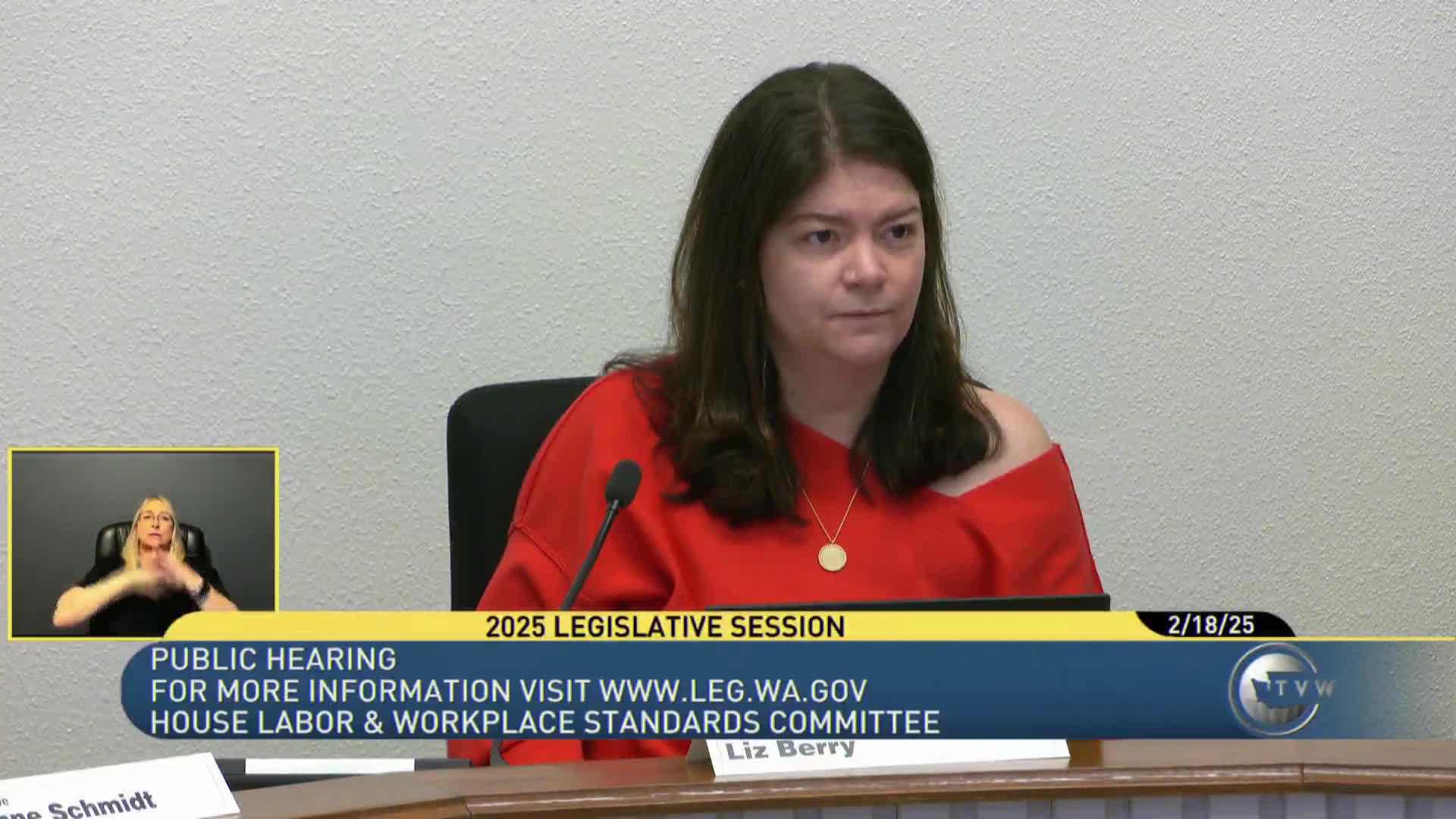Domestic Workers Bill of Rights draws testimony calling for statewide protections
Get AI-powered insights, summaries, and transcripts
Subscribe
Summary
The Labor & Workplace Standards Committee on Feb. 18, 2025 heard House Bill 15 61, a proposed substitute that would extend minimum workplace standards — including written contracts, wage and overtime rules, meal and rest breaks, and notice before termination — to domestic workers statewide.
The Labor & Workplace Standards Committee on Feb. 18, 2025 heard House Bill 15 61, a proposed substitute described in staff briefing as applying minimum standards and enforceable rights to domestic workers and their hiring entities across Washington State.
Kelly Leonard, staff to the committee, summarized the proposed substitute. The substitute would define “domestic worker” to include nannies, house cleaners, home care workers, cooks, gardeners and household managers, while excluding casual babysitting, dog walking and short incidental work. Hiring entities would be required to pay at least minimum hourly wage and overtime, allow uninterrupted meal and rest breaks, permit domestic workers to cook and eat their own food with reasonable restrictions, maintain written records and provide written terms and advance notice of termination (two weeks generally, four weeks for live‑in workers). The substitute would create civil penalties enforceable by the Department of Labor & Industries and preserve a private right of action. It also would remove some exemptions in the minimum wage act that currently exclude certain live‑in domestic workers, and would require L&I to convene a work group to investigate industrial insurance access for domestic workers.
Representative Monica Stonier, prime sponsor, said domestic workers are often isolated and left out of basic workplace protections. “This bill would provide some protections for domestic workers who are often working in very isolated environments without the protections that you might have in a more traditional workplace,” Representative Monica Stonier said.
Multiple domestic workers offered firsthand testimony in support. Laura Gonzalez, who said she has worked as a nanny in Seattle for more than 20 years, described working without contracts, paid holidays or sick pay for many years and said Seattle’s local standards revealed the rights many workers lack elsewhere. Lilia Salmeron, who said she is a nine‑year domestic worker and was diagnosed with breast cancer in 2023, described chemotherapy appointments and the need for paid time off to cover medical care and basic costs. Veronica Sanchez, a house cleaner who said most of her jobs are outside Seattle city limits, told the committee she currently lacks paid sick days in many of the locations where she works and urged statewide coverage.
Worker advocates, including Danielle Alvarado of Fair Work Center, said the bill addresses recurring problems such as wage theft, lack of written terms and intimidation. “Workers are experiencing wage theft, intimidation, and sickness right now with no clear recourse,” Alvarado said.
Several witnesses raised issues for the committee to consider. Rachel Block, a Seattle host of au pairs, asked that au pairs on J‑1 visas be excluded from the substitute’s minimum‑wage provisions because host families provide room and board and federal regulations govern the J‑1 au pair program. Ingrid Chapman, a former employer of a nanny, said a required contract provided clarity and mutual respect in her household and urged support for the broader bill. Doris Henricks, a former au pair and nanny, urged the committee to include au pairs in fundamental workplace protections, saying the federal program does not eliminate risks of unpaid wages or denial of time off.
Representatives of faith and employer groups also testified. Jean Welchel with the Washington State Catholic Conference voiced support citing human dignity. The Washington Retail Association did not testify on this bill specifically in this portion of the transcript but appeared elsewhere to comment on documentation standards for leave policies.
The committee closed the public hearing on House Bill 15 61 during the Feb. 18 session. No committee vote on the bill was recorded in the provided transcript.
Clarifying details recorded in the staff briefing include required written terms of employment, specified notice periods before termination, severance where notice requirements are not met, enforceable anti‑retaliation protections, and L&I’s convening of a work group on industrial insurance access for domestic workers.
